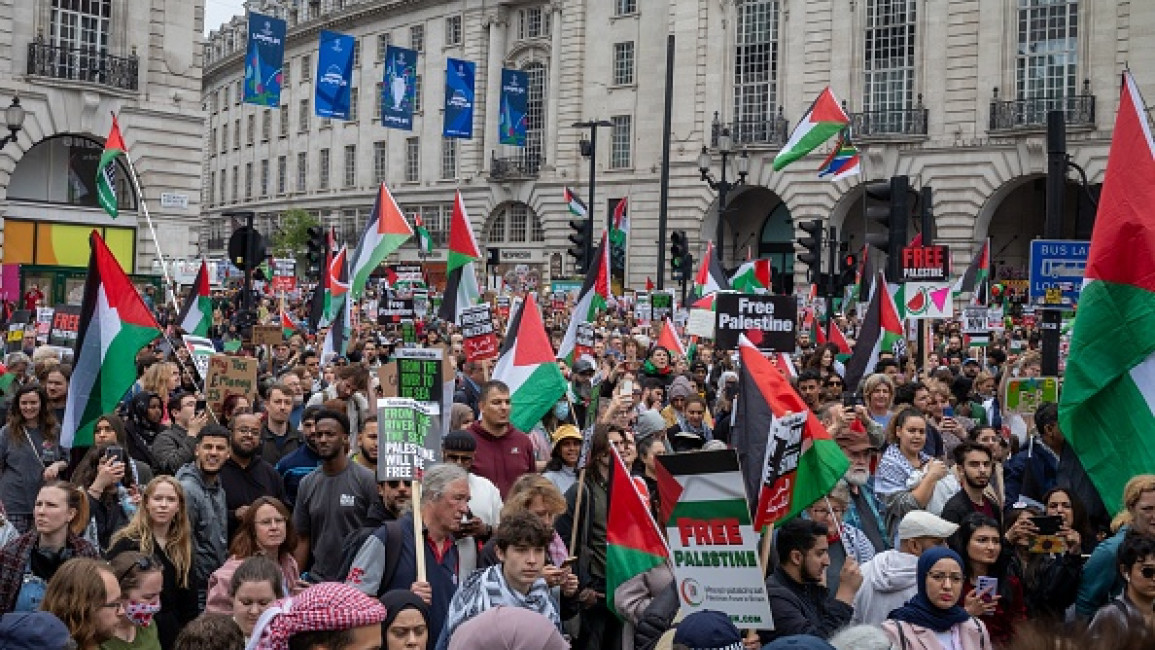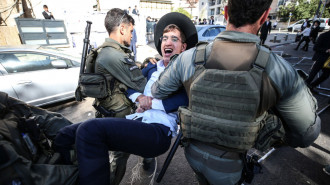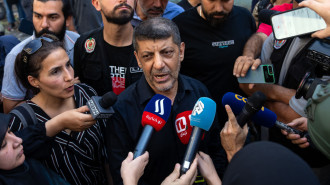'Whatever they throw at us, Free Palestine': UK pro-Gaza protester found not guilty over ‘coconut’ placard
A London woman was acquitted of a racially aggravated public order offence on Friday after displaying a placard depicting former UK Prime Minister Rishi Sunak and Home Secretary Suella Braverman - both of South Asian heritage - as coconuts in a trial that has brought the issues of free speech and satire to national prominence.
Marieha Hussain, 37, was charged by police after carrying a satirical placard at a protest against the Gaza war last year, a reference to a term that suggests some people who appear brown on the outside are 'white' on the inside.
Hussain, who is also almost nine months pregnant, pleaded not guilty to the offence at Westminster Magistrates’ Court when her two-day trial began on Thursday, saying she "did not have a racist bone in her body".
On Friday, judges ruled that the 37-year-old was not guilty, to the spontaneous applause of the courtroom.
"Relieved and happy are the main words I can think of to express how I feel," Hussain told The New Arab shortly after the verdict was read out.
"I'm really relieved and truly happy, and I'm really grateful to God right now."
When asked if her ordeal should make others wary of attending pro-Palestinian protests she responded: "Don't be afraid, you must go. We have been going, we must go, we must never stop!"
"Whatever they throw at us, we just keep going. Free Palestine!"
'Political satire'
The prosecution argued on Thursday that the satirical cartoon was "racially abusive" and some people at the protest could have been alarmed or distressed by the coconut depiction.
Prosecutor Jonathan Bryan opened the court by saying the term "coconut" is a "well-known racial slur" with "a very clear meaning".
Hussain asserts her placard was meant to be a political statement of the two political figures shown in a "British satirical way", and if any police officers at the demonstration had objected to the sign then "of course" she would have removed it.
Her defence team, led by Rajiv Menon KC, argued the placard was "not abusive" and the term coconut is not a racial slur but "political speech" directed at Braverman and Sunak.
District Judge Vanessa Lloyd agreed, saying the placard was "reasonable" and part of political satire with Hussain "exercising [her] right to freedom of expression".
11 November march
It all began when Hussain was photographed holding the placard at a Gaza protest on 11 November, which was widely shared on social media and picked up by the popular political blog Harry's Place which tagged London's Metropolitan Police in an X post.
Three days later, Hussain attended a voluntary interview at an Islington police station with Detective Superintendent Shah, who was a witness to the case, telling the court that due to the nuances of the term, the Met sought expert opinion from Professor Andrews of Birmingham City University about whether a crime had been committed.
Despite the professor's recommendation that the term is "not a racial slur and does not constitute a racially aggravated public order offence", the Met went ahead with the charge.
Racial slur debate
Hussain's charge triggered huge debate in the UK about whether the term is a hate crime, with many people of colour saying they did not consider "coconut" a racial slur.
Hussein insisted that she merely wanted to reflect the divisive language used by the two senior Conservative politicians about the pro-Gaza protests, including when Braverman dubbed them "hate marches".
Braverman was fired as Home Secretary by Sunak shortly after criticising the police's response to the pro-Palestine marches which had erupted across the UK, which she believed were handled too softly.
Her comments not only outraged police officers who believed the comments were stoking tensions but also the demonstrators who believed they were being targeted by Braverman for simply exercising their democratic right to protest in a peaceful and respectful way.
"I was trying to highlight the policies and the rhetoric that Suella Braverman was saying and doing at the time that Rishi Sunak was supporting at the time as racist," Hussein told the court on Friday.
"There was no hate speech, it was a satirical placard, it was funny, it was comical," Hussein asserted, saying she was "distressed" by the idea that there was any racist intent in the poster.
"All of the placards were positively reacted to, we had a lot of people asking to take photos, how much they enjoyed, asked to take photos with our placard," Hussein recalled on the day of the march.
"There was no hint of an issue that entire afternoon."
Expert testimony
After getting lost after the march, Hussain recalled she and her family approached two police officers standing near Victoria Station.
Hussain says that while officers had a "really good look at the placards" none made any comment about the poster.
Expert witness Professor Augustine "Gus" John told the court he "can't imagine such a scenario" that the term could be conceived as racially abusive and stressed that "context is key".
"The history does not represent hate crime or language of hate," he told the court.
"Political satire is not unknown in this country, I see this placard being of this satire."
Professor Gargi Bhattacharyya told the defence: "I would not understand why people can't see it as a political statement."
"I can't imagine a time when holding an image of a coconut is abusive. I consider it is likely the majority understood the placard was satire."







 Follow the Middle East's top stories in English at The New Arab on Google News
Follow the Middle East's top stories in English at The New Arab on Google News


